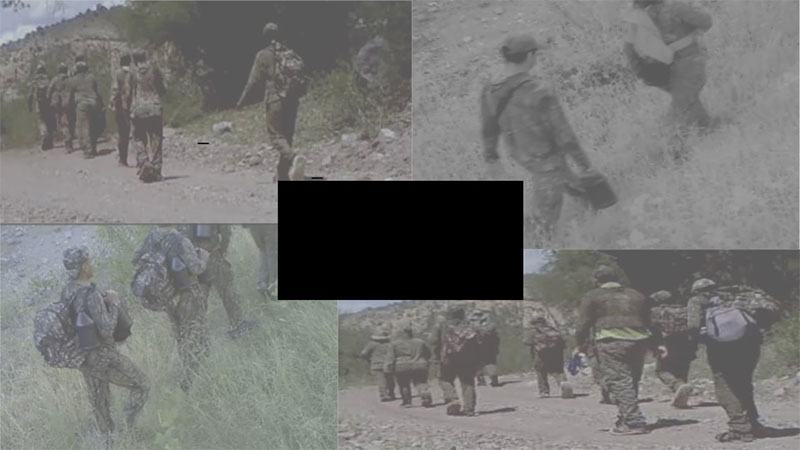
As the nation’s largest southern border crossings finally receive mainstream media coverage years into an unprecedented illegal immigration crisis, untold numbers of “fighting age males” dressed in military uniforms are entering the United States through remote areas with no Border Patrol presence. It is a palpable security lapse unlikely to be reported by most news outlets and local, federal, and state law enforcement sources have provided Judicial Watch with detailed accounts, reports, diagrams, and photos of the situation which is terrorizing residents in a once harmonious Arizona town just a few miles from Mexico. They blame the Biden administration’s catastrophic open border policies for the serious problems that have gripped the area in the last few years.
The Santa Cruz and Pima County regions in southwestern Arizona have been slammed with extraordinary violence and crime fueled by Mexican cartels—smuggling drugs and humans—that are victimizing fourth and fifth-generation cattle farmers who have captured thousands of illegal immigrants on security cameras passing through their property since Joe Biden became president. Sometimes they find dead bodies and drug paraphernalia. “Violent activity has drastically increased over the past three years since the border is now perceived to be wide open,” a veteran law enforcement official told Judicial Watch this week, adding that in the communities of Amado and Arivaca American citizens feel much less safe than they did when Donald Trump was president. Both are cattle ranching towns with small populations that are diminishing because of the increased violence. Amado is nestled in the Santa Cruz River Valley about 29 miles from the Mexican border. Arivaca is situated southwest of Amado about 11 miles from Nogales, Mexico.
An unmanned Border Patrol checkpoint east of Arivaca worries residents deeply, but the Department of Homeland Security (DHS) has no intention of deploying agents, according to multiple sources. In the meantime, law enforcement officials and residents confirm that young men are pouring in through the region in what appears to be an organized movement operated by Mexican cartels. “They are unemployed, the majority are fighting age males and there is a strong possibility some have undergone some level of insurgency training,” according to a law enforcement source familiar with the situation. The groups of men are usually dressed in “camouflage military uniforms, indicating a robust and well-funded supply network to ensure everyone is outfitted the same,” said an intelligence officer with extensive U.S. military training who provided Judicial Watch with pictures and graphs of recent crossings. The uniformed men also carry camouflaged backpacks and wear carpet booties to hide footprint tracks. Large piles of the disposed carpet booties litter ranches on the U.S. side, creating a hazard for cattle that consume the trash.
One longtime area rancher said that since Biden became president, he has recorded over 3,560 illegal immigrants on security cameras on his property, a tenfold increase from the previous administration. Another said he has not seen a Border Patrol agent for quite a while, likely because the frontline Homeland Security agency is overwhelmed with the onslaught of migrants in the last few years. “They have recommended we not travel to certain areas of our ranch, and we never go out there at night,” said the rancher, who does not want his name used out of fear for the safety of his family. Locals say the violence is causing the already small population of Arivaca to dwindle quickly. A few years ago, the town had 1,200 residents and now there are approximately 600. Authorities say those who leave are mostly relocating north to Green Valley, about 35 miles away, or Tucson which is around 60 miles away. The area has become so dangerous that the U.S. Forest Service told a rancher it would no longer travel there to monitor enclosure areas established to oversee endangered species.
The continuous stream of trash and human waste left behind by the staggering flow of migrants and smugglers has also devastated the local environment and livestock. Besides large piles of discarded carpet booties, mounds of plastic waste are having a detrimental effect on cattle because they eat it and become ill, ranchers said. Many also die after ingesting traces of drugs found in wrappings left behind by smugglers. To help illustrate how porous the border is in this region, one rancher said Mexican cattle regularly cruise into the U.S. side, creating a major risk of introducing illnesses to American cattle that, although inoculated, may be vulnerable to new strains and diseases that may prevail south of the border. “We removed 120 Mexican cattle over the past six months,” said a veteran rancher, who explained that it is a lot of extra work to keep the foreign livestock from mingling with local cattle to prevent unsafe beef being distributed throughout the U.S. food industry.
If Biden gets reelected the situation will likely worsen, say law enforcement officials and residents in the remote Arizona region. Other small towns are also suffering from the impact of this administration’s flagrant open border policies. Just a few months ago Judicial Watch wrote about another once tranquil border region that has been devastated by illegal immigration and drug smuggling. It is situated in Cochise County to the east of Amado and Arivaca in the picturesque Sonoran Desert surrounded by the scenic Huachuca Mountains. Human and drug traffickers regularly evade a meager force of Border Patrol agents in the mountainous region and local law enforcement officials say the addition of the new “American smuggler,” U.S. citizens, predominantly young adults from Phoenix and Tucson recruited by Mexican cartels through social media, has created deadly consequences in the communities where the American recruits often travel at dangerously high speeds through local roads and highways.
















